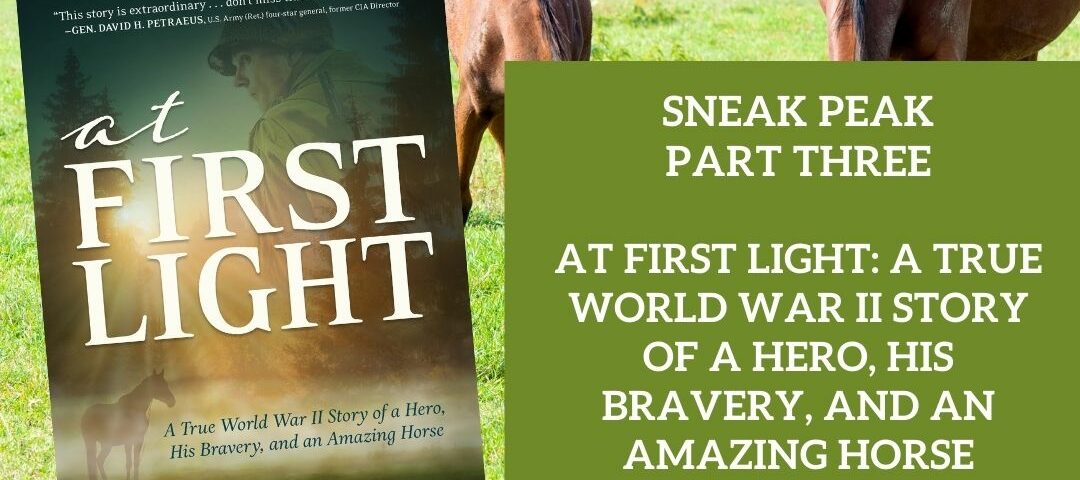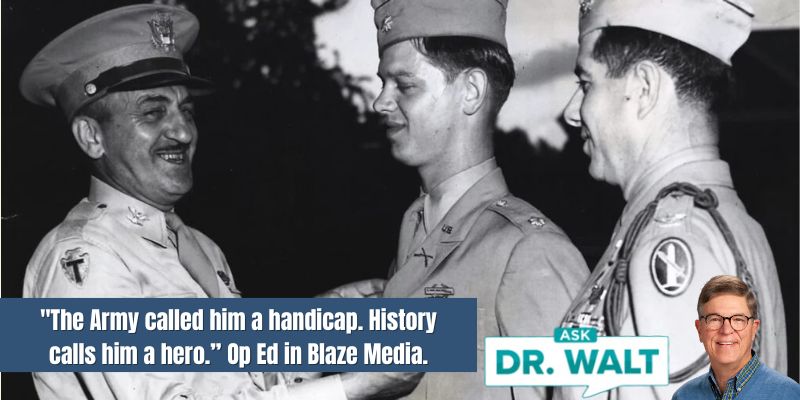
Are plant-based foods really tied to lower risk of cognitive decline? Or not?
April 15, 2022
My Easter Sermon
April 17, 2022SNEAK PEAK – Part Three – At First Light: A True World War II Story of a Hero, His Bravery, and an Amazing Horse
With the permission of my publisher, for the month of April, I’m giving you a SNEAK PEEK of the first five chapters of my latest book — a wonderful story about my father’s heroism and exploits before and after World War II. Here’s CHAPTER TWO of At First Light: A True World War II Story of a Hero, His Bravery, and an Amazing Horse.
“I’ve known Walt Larimore for many years and have tremendous respect for him. He has always been a great storyteller, and the real-life account of his father’s experiences in World War II shared in his new book, At First Light, are riveting. This is a fascinating story of an American hero whose leadership and sacrifice are truly inspirational.”
—Joe Gibbs, five-time NASCAR Cup Series champion (as team owner), three-time Super Bowl champion (as a coach), two-time NFL Coach of the Year, inductee into the NFL and NASCAR Halls of Fame, and bestselling author of Game Plan for Life
Order Here
CHAPTER TWO
THE BIG MUDDY
“The spirit is there in every boy; it has to be discovered and brought to light.”
—Robert Baden-Powell, 19th century British Army officer and founder of the worldwide Scouting movement
Since his earliest days, Philip had been an excellent swimmer. During the summer of 1936 when he was eleven years old, he took a junior lifeguard course with his pals, Luke McLaurine and Billy O’Bannon, at Camp Currier, a 300-acre Boy Scout camp located just south of Memphis near Eudora, Mississippi.
Late that summer, they convinced their moms to allow them to swim the Mississippi River as part of an annual race sponsored by the Memphis Chicks semi-professional baseball team. Their competitors, all of them teenage boys, boarded a rented paddle steamer and were taken about fifteen miles upriver.
Once at the starting point, the boat turned sideways. On the steam whistle signal, all the boys leaped off the top deck of the paddle steamer and into the river. The current moved steadily at ten miles an hour, and the smooth water was the color of milk chocolate; thus, the river’s nickname, “The Big Muddy.”
While the older boys swam for a trophy, the younger boys just paddled down the river accompanied by a small armada of sixty motorboats, each equipped with a pile of swim vests in case anyone encountered trouble. When Philip, Luke, and Billy successfully swam to the pull-out on the southern point of Mud Island, a peninsula on the east side of the river that connected to downtown Memphis, they ran out of the water screaming in joy, hugging and swatting each other’s backs, and feeling exceptionally manly and heroic.
This only emboldened them the following year when, on an unusually warm, seventy-six-degree day in March, Philip and Billy decided to swim across the mighty Mississippi, unaware that the fast-moving river was carrying the largest volume of water since the historic flood of 1927. The ordinarily tranquil waterway, now the color of intensely dark chocolate, was a frothing, pulsating monster that roiled and rampaged downstream, throbbing with the unrestrained power of one million gallons of water per second rushing south. The newspapers further downstream were calling it the “Great Flood of ’37.”
After placing towels and their clothes into small waterproof backpacks, the boys dove into the raging current just south of where the Loosahatchie River drained into the Mississippi River, about four miles north of the Mississippi River bridge crossing from Memphis to Arkansas. They stroked across a three-quarter-mile section of the bone-chilling, raging torrent, dodging trees and barrel-sized litter to the large and mostly wooded Loosahatchie sandbar near the west bank.
Philip thought they were far enough upriver that their swim would put them safely on the sandbar, but the current swept them downstream three miles so fast that they were barely able to make it to shore in a small bay on the southern section of the sandbar. Although exhausted and shivering from their ordeal, they each pulled out a towel from their backpacks, dried off, and briefly warmed themselves in the midday sun. They considered the option of hiking a half-mile across the island, swimming a half-mile channel, and then walking almost two miles to the bridge and hitchhiking back to Memphis.
After thinking things through, they decided that they had no choice but to swim back to Memphis from the uninhabited island.
Philip, who had meticulously studied maps of the area in planning their escapade, reasoned they should aim for Mud Island. Given the incredible speed of the water, he calculated that they’d need to walk at least a mile up the Loosahatchie sandbar before taking off, which would give them a greater margin of safety, as well as more time to warm up from the cold water.
Philip spied a small herd of Shetland ponies grazing on the south end of the island. He and Billy walked up to them, and finding them tame, chose two to mount bareback. Grabbing the ponies’ manes, the two boys whooped and hollered as they rode their steeds back up the island. After dismounting, saying a brief prayer, and encouraging each other with an Indian chant they learned as Scouts, they slowly waded back into the frigid water and began their swim to the distant shore. Fortunately, Philip’s calculations were correct, and it became clear they were going to make it to the safety of Mud Island.
Near the end of their swim, however, Billy ran out of steam and began to go under. He screamed out, yelling for help. When Philip saw his buddy panicking and fighting to keep his head above water, he used powerful strokes to bridge the distance quickly. Calling upon his lifeguard skills, Philip dove just below the surface and grabbed Billy by the waist. Then he promptly turned his buddy, surfaced, put him in a cross-chest lock, and hauled him to shore at Joe Curtis Point on Mud Island’s southernmost section. Upon reaching dry land, Billy dissolved into tears, embracing Philip, and thanking him repeatedly for saving his life. After a time to rest and warm up, they dressed and hitched a ride back home.
Although Billy wanted to nominate him for a Red Cross or Boy Scout medal for bravery, Philip begged him not to. He didn’t want to get into more trouble because he was sure his father, upon learning of another one of his harebrained escapades, would reward him with yet another trip to the backyard toolshed for a whipping. This time Philip was lucky to escape punishment since he’d saved his friend’s life, but he realized how close he had come to losing his buddy to the heartless river.
*****
Philip’s twelfth birthday was his most memorable. At the stables, he learned that the world-famous Lipizzaners from the Spanish Riding School in Vienna, Austria, would be performing at the fairgrounds the same weekend as his birthday. On a Saturday morning, Philip rode the trolley to the fairgrounds and watched the horses and their trainers practice the choreographed steps they would execute at their evening performance. He spent most of the day with the riders and grooms, asking endless questions. Best of all, they allowed him to brush and groom some of the magnificent stallions.
While brushing and talking to one of the Lipizzaners during the early afternoon, an observant stableman from Austria leaned toward him.
“A stallion like Gustav here may be perfectly schooled after about six years, but an apprentice rider—what we call an Élève—needs a full ten to twelve years of training to earn the right to show these magnificent horses,” the stableman said. “They first have to spend years feeding, grooming, and leading the horses around before they are allowed actually to ride a Lipizzaner. After that, they graduate to the rank of Assistant Reiter, or assistant equestrian. Few outsiders—maybe a royal here or there—have ever been granted permission to ride one of our Lipizzaners. But I can tell that Gustav here has taken a shine to you and that you have the makings of a master equestrian. Would you like to mount him?”
Philip’s eyes widened in wonder as a smile spread ear to ear. “Are you kidding me? I’d love to!”
The man smiled and looked around to be sure they were alone. He nodded and indicated to Philip that he would lift him onto the back of the massive stallion. Philip could feel the steed’s muscles quiver between his legs. He instinctively leaned forward to stroke the horse’s neck and whispered into his ears. Gustav immediately calmed down, shook his head, and continued to feed.
“He likes you,” the man whispered. “But let’s get you off before I get into big trouble.”
In the late afternoon, Philip’s mother hosted his birthday party, with cake and ice cream, and then took him and several of his friends to the arena for the evening show. They were mesmerized by the gala performance as they watched the expert riders and their Lipizzaners demonstrate the most demanding movements, all accompanied by classical Austrian music.
At one point, a stallion was led into the ring on a long rein without a rider. Philip recognized Gustav and leaned forward as the stallion was led to the center of the ring. The announcer described each increasingly tricky jump.
“We call these ‘the airs above the ground’ or ‘school jumps.’ Only certain breeds have the strength and intelligence to perform these difficult airs today.”
The crowd applauded after each incredible movement.
“To complete this amazing performance, Gustav will demonstrate the capriole, a word which means the ‘leap of a goat.’ On command, he will jump straight up into the air, kicking out with his powerful hind legs, and then land on all four legs at the same time. It is considered the most difficult of all the airs above the ground.”
The crowd burst into raucous applause after Gustav completed the arduous maneuver flawlessly, while Philip sat captivated. Then the boy’s heart skipped a beat when the horseman led the stallion toward him. He recognized the “stableman” who had put him on the same Lipizzaner that morning. The man spoke to the horse, which then bowed by kneeling on one leg, extending the other leg in front, and lowering his head to the ground. The horseman smiled, tipped his black riding hat toward Philip, and mouthed, “Happy Birthday.”
The crowd erupted in applause again as all attention fell on Philip. He felt exceptionally proud and would never forget that day or Gustav’s capriole and bow. The boy vowed to himself that he’d one day travel to Europe to see these magnificent horses in person again.
Little did he know that would happen in an unimaginable way.
*****
The school years became more challenging for young Philip as he continued to do poorly in academics. His mother found it increasingly difficult to discipline him, mostly since his father was away from home on railroad trips so often.
Finally, at her husband’s insistence and the encouragement of Philip’s scoutmaster, Ethyl applied for her son to attend the Gulf Coast Military Academy (GCMA) in Gulfport, Mississippi, a distance of 360 miles. GCMA’s motto was, “Send us the boy, and we will return you the man.” She could only pray that this would be the case for a fun-loving son not inclined to academics.
His four years at GCMA were a success by every measure and among the best in his life. The structured and regimented environment proved to be a stimulating learning atmosphere for the easily distracted teenager. Although Philip struggled with some of the mundane academic subjects, military topics became his forte—military history, strategy, operations, tactics, and weapons.
He turned out to be a quick learner when motivated, and he became adept at competitive shooting, compass work, navigation, wilderness skills, sailing, and close combat. Philip also learned to fly a Piper Cub at a nearby airbase and became certified as a glider pilot. He enjoyed his time in the air, but the two areas in which he experienced even more joy were equitation—the art of horsemanship—and romance.
His happiness as an equestrian was primarily due to a feisty, chestnut Thoroughbred stallion nicknamed Moose. A trainer tried to steer Philip to a gentler horse, explaining, “Thoroughbreds are known for their agility, speed, and spirit, but they are also hot-blooded horses.” But when Moose lowered his nose and relaxed as Philip spoke to him and stroked him, their partnership was sealed.
Moose was large by Thoroughbred standards, standing seventeen hands and weighing just under 1,200 pounds. Moose’s rich mahogany coat made him look—except for the absence of antlers—like one of his namesakes. On Moose’s back, Philip not only excelled in showing, jumping, and steeplechase competitions, but he also won more show ribbons than he could count.
As for the romance side, that excitement started in his senior year of high school with a blind date. Marilyn Fountain was a beautiful brunette with a thin face, high cheekbones, and a radiant smile. She was from Des Moines, Iowa, and had just begun her freshman year at Gulf Park College in Gulfport, a junior college for girls close to the Gulf Coast Military Academy, even though she and Philip were born weeks apart.
They met because Philip’s roommate at GCMA, Billy “Tex” Metts, began dating one of Marilyn’s suitemates. After Billy found out that Marilyn’s father was an Army officer and that she had a fondness for horses, being the newest member of her college’s Bit and Spur Club, he deduced she and Philip might be a match made in heaven.
Billy arranged for them to meet under the Friendship Oak located on the campus of Gulf Park College. This massive Southern oak stood over five stories tall and spread its immense fingers of foliage over 150 feet in each direction, providing over 16,000 square feet of cool, moist shade.
The Friendship Oak was also the center of a legend: those who entered the shadow of her branches would remain friends for all their lives.
Under this magnificent tree, Philip and Marilyn first met, and then not too many days later, they first held hands and kissed. In the fall of 1941, the young couple could not have been happier, but they had no idea how their lives were suddenly going to be altered forever.
Order Here
© Copyright WLL, INC. 2022.





